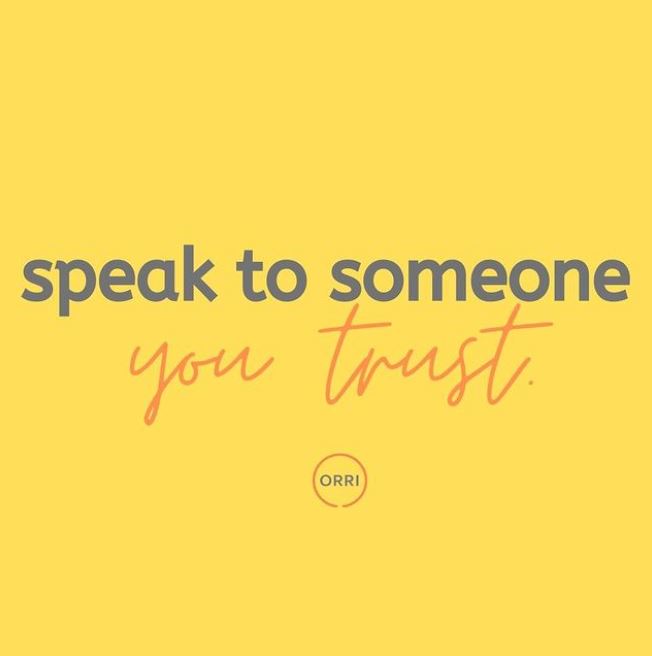Detecting an eating disorder early increases the chance of recovery. Healthista spoke to specialist clinic Orri on the signs of eating disorders and how to offer advice
Eating disorders can be difficult to handle both for loved ones and the person suffering. Whether that is approaching someone with an eating disorder or reaching out for help.
Noticing signs of an eating disorder or being able to ask for help is so important.
around 45 per cent of both anorexia and bulimia patients make a full recovery
The earlier an eating disorder is recognised and treatment begins, the better the sufferer’s chance of recovery.
Studies have shown that around 45 per cent of both anorexia and bulimia patients make a full recovery, with around 30 per cent improving.
It’s important to start a conversation with a friend who you think may be struggling in the appropriate manner.
Healthista spoke to Orri, a private specialist clinic for those aged 16 and over, on the common signs of eating disorders, how to help someone who may have an eating disorder and how to ask for help if you have an eating disorder.
#1 Isolation and secrecy
Eating disorders thrive in isolation.
You might notice your friend retreating into themselves, becoming more isolated, avoiding social interaction, spending an increasing amount of time alone and not talking as much as they used to.
Eating disorders thrive in isolation.
This kind of retrieval can be a key sign of an eating disorder. Sufferers can retrieve into themselves as eating disorders are not just about food and body image.
Eating disorders are deeply connected with underlying triggers associated with low self-esteem or interpersonal battles.
#2 Preoccupation with food
You might notice your friend becoming more occupied with food.
This can show up in someone starting to count calories, plan meals well in advance, or appearing increasingly concerned about the preparation of food or the nutritional content, perhaps at friends’ houses or at restaurants.
You may notice food going missing, find wrappers or evidence of large quantities of food having been eaten.
Sometimes people become preoccupied with taking pictures of food, or view lots of food-related content, but perhaps not actually eating much.
They may also appear to spend long periods of time preparing and cooking food.
#3 Disordered perception of body shape & weight
A disordered perception of body shape can be noticeable in someone making increasingly frequent, negative comments about their body weight or shape.
It might appear like their entire sense of self-worth and mood is derived from how they feel about their appearance.
The person they see in the mirror may seem completely different to who you are seeing in front of you – this is known as body dysmorphia.
frequent, negative comments about their body weight or shape
Also, your friend might be constantly checking their reflection in the mirror, touching certain parts of their body – this is called ‘body checking’.
#4 Fear of gaining weight or pursuit of thinness
In pursuit of weight loss or thinness, your friend might be cutting out entire food groups and becoming obsessed with what they consider to be ‘good’ or ‘bad’ food.
For some, becoming vegan or vegetarian, or following another diet that restricts certain food types, can be a way of removing fear foods from their diet.
They might be compensating for anything they eat by over-exercising or taking frequent trips to the bathroom to purge food eaten by vomiting or taking laxatives.
#5 Psychological changes
They may be becoming increasingly depressed or anxious. Perhaps they’re easily unsettled by situations around them or become angry or aggressive as a defence mechanism when you try to reach out and connect.
A person’s sense of self-worth and mood can rapidly deteriorate, as an eating disorder develops. They may start to constantly question themselves, always feeling not good enough.
#6 Physical changes
A clear sign of concerning behaviour is a change in someone’s weight.
Whilst weight is by no means the only indicator of an eating disorder, a significant change is important to notice.
You might notice that they get light-headed, complain of digestive issues, are always cold no matter how warm the environment, and look pale and tired.
weight is by no means the only indicator of an eating disorder
Another physical change is dental issues that can arise if someone is purging by vomiting.
In women, periods can stop as the body is forced to prioritise certain mechanisms over others outside of homeostasis.
How to talk to and support a friend who has an eating disorder:
#1 Talk to them
It’s so important that you communicate your concerns if you feel that someone is struggling.
Pick a time when tensions aren’t running high and when the other person appears to be receptive.
Approach the topic gently and with compassion, keeping in mind that despite how they may appear, eating disorders are not about food. Rather, food is a symptom of often much more complex, underlying causes, with emotional distress often at the root.
You shouldn’t focus on food behaviours in isolation as it may cause defensive behaviour or them to deny their experience.
food is a symptom of often much more complex, underlying causes, with emotional distress often at the root
It is very important to keep lines of communication open as you may need to return to the conversation multiple times depending upon how ready they are to talk.
#2 Find a specialist who may help
Finding specialist help is vitally important.
An eating disorder psychotherapist, psychologist or specialist clinic, combined with a specialist dietitian, can help people understand more about their experience and take important steps towards recovery.
It can be incredibly hard to witness someone you care about going through so much pain, particularly when physical symptoms can be so damaging.
Finding specialist help is also vitally important
If you are being significantly impacted by your loved one’s illness, remember that you can also reach out for your own help. You cannot help someone if you are not looking after yourself.
#3 Educate and inform yourself
By informing yourself about eating disorders it can make it easier to have an open conversation.
There are many myths and misconceptions around eating disorders that, if acted upon, can cause more damage than good.
The person themselves may be very confused and scared about what they’re experiencing. Demonstrating a degree of understanding may serve to bridge the distance between you and their inner experience.
#4 Avoid diet talk
Whilst eating disorders are not about food, be mindful of how you talk about food and your food choices around someone who is struggling.
By engaging in a talk that labels food as ‘good’ or ‘bad’ you’ll risk exacerbating someone’s fixation on the foods’ nutritional content.
#5 Remember your own self-care
It is vitally important that you recognise and look after your own needs, as well as the needs of others.
As the saying goes, ‘one cannot pour from an empty cup’ – we can only care for those around us if we have enough in the tank to do so.
Boundaries are needed to ensure your needs are tended to and your energy is protected, whilst being a role model for self-care for your friend.
#6 Hold onto hope that recovery is possible
We know that recovery is possible because we see it happen every day at Orri.
recovery is possible
Everyone’s recovery journey is different, and there will be ups and downs along the way. Holding onto hope during even the darkest of times helps to light the way out of those moments.
If you have an eating disorder and want to talk to a friend:
#1 Appreciate your courage
Take a moment to recognise the situation that you are in and that you’re ready to open up and share what you’re experiencing.
Reaching out and communicating is an incredibly positive and important step, but also extremely daunting during a challenging time. Because we’re not able to control someone’s response, it might feel easier to not communicate at all.
So, appreciate your courage to reach out despite how vulnerable and exposing it might feel.
#2 Consider what you want from the conversation
It’s important to put some thought into what you want from the conversation. Ask yourself:
- What do I want to communicate today? What do I want heard?
- How much can I expect them to understand/not understand?
- What are my expectations from the conversation?
- After the conversation, how do I want to suggest communicating going forwards?
- What do I do if the conversation doesn’t quite go to plan?
By taking time to answer these questions, you’re providing yourself with the opportunity to prepare.
#3 Pick a time where emotions aren’t running high
We know how tempting it is to ‘hash everything out’ in the moment when moods are tense and tempers are high.
However, to be truly heard and listened to, it’s best to wait till everyone is relaxed and not prone to react.
#4 Remember that you’re all in it together
Keep in mind that people communicate their love and care in different ways.
We all have our unique stories and reasons for how and why we process our experiences and other people around us.
people communicate their love and care in different ways
Someone responds with anger, confusion or any perceived negative emotion. But remember that it might be frustration that they’re feeling towards themselves for not being able to meet you where you need.
If you can, respond to them with love and explain that it’s okay if they don’t understand right now. The important thing is that there’s an open dialogue between you and those you care about.
Orriis a specialist eating disorder treatment centre based in London who provide both online and in person day treatment for those aged 16 and over.
Visit www.orri-uk.com for a wealth of eating disorder information and blogs, or you can call their admissions team to find out more about their treatment options – 0203 918 6340
Orri also work with eating disorders charity Beat whose website and helpline are also available.
More Healthista Content:
Eating disorders: 6 myths to be aware of
Conception: should I get an ovarian reserve test?
THIS is how you improve digestion and help your bloated stomach
From Britney Spears to Kanye West: 12 best songs proven to take your workout to the next level
Like this article? Sign up to our newsletter to get more articles like this delivered straight to your inbox.



























































